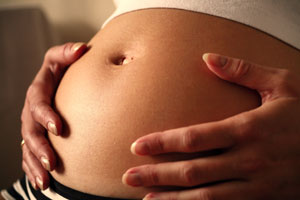The adverse affects of the rising obesity rate in America just keep on multiplying.
A new study published in the Journal of Pediatrics has some alarming new findings concerning pregnancy and obesity, suggesting that mothers who are obese or have diabetes are more likely to have a child with autism or other developmental issues.
Researchers were specifically wanting to know whether or not a child was more likely to have autism if the mother was obese, had diabetes, or had high blood pressure during pregnancy. What they found was that if a woman had one of these three conditions, the increased risk for her child was about 60%, although the overall risk remained relatively minimal.
The study included about 1,000 mothers, half of whom had a child with an autism spectrum disorder. The rest had a child with either no developmental problems, or a developmental delay unrelated to autism. The findings suggested that women with one of these three conditions more than doubled the chance that their child would have some kind of developmental delay.
Scientists say this is because it appears that obesity and diabetes are potentially affecting early brain development, either because they tend to cause inflammation in developing tissue, or because they can reduce the amount of nutrients reaching the fetus.
In an interview with NPR, Irva Hertz-Picciotto – one of the study’s authors – said what they’re talking about is a fetal brain that could be suffering from hypoxia, which is a lack of oxygen.
Among the three risk factors in the study, obesity was found to be the greatest concern since it affected more than 20 percent of the mothers with an autistic child. And since obesity also increases the risk for diabetes and high blood pressure during pregnancy, the three seem to be intertwined.
These new findings are particularly troubling since obesity and diabetes are on the rise. And even more so because according to recent government figures, one-third of women of child bearing age are obese. And one child in 88 currently has an autism spectrum disorder.
According to DietsInReview.com’s Registered Dietitian, Mary Hartley, RD, the Institute of Medicine issued guidelines in May 2024, lowering the minimum recommended weight gain for obese women from 15 pounds to 11 pounds.
Hartley also reported that more findings could potentially be rendered from a large four-year trial called the Healthy Moms Study that will be published sometime in 2024. The goal of the study is to keep obese pregnant women from gaining any weight at all. If the women do gain, researchers seek to limit it to three percent of their pre-pregnancy weight. The women in the study are following a 2,000 calorie diet that emphasizes fruits, vegetables, whole grains, lean meat and low-fat dairy products.
We’ll be curious to know what this study concludes. In any case, with obesity on the rise it seems we have one more reason to concerned, especially when it comes to the health of our children.
Also Read:
Pregnancy Healthy Eating and Weight Gain Guide
